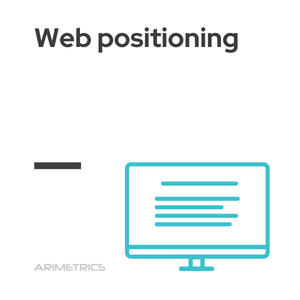
Definition:
Web positioning is the set of actions that are carried out to place web pages at the top of the list of search engine results.
How web positioning arises
Search engine optimization began in 1990 when search engines began cataloging the first Internet.
The term search engine optimization began to be used in the summer of 1997 by the company Multimedia Marketing Group
In 1998 Stanford students, Larry Page and Sergei Brin developed Backrub which was a search engine that was based on a mathematical algorithm to measure the relevance of a website and that was the precursor of Google, since they are the creators of Google, the search engine.
Currently it is Google who creates the rules of web positioning, since it is the most used search engine on the planet followed at a long distance by others such as Bing, Yandex or Baidu.
Types of web positioning
Depending on the marketing strategy that is followed, web positioning can be of two types:
Organic Positioning
Also called natural positioning or SEO, its acronym stands for Search Engine Optimization (search engine optimization)
SEO is a series of strategies, techniques and tactics used to increase the number of visitors to a website and that seeks to position itself at the top of the search engine results page, also called SERPs.
PPC Positioning
Also called SEM positioning (Search Engine Marketing), PPC positioning (for its acronym in English Par Per Click) consists of carrying out a strategy of paid ad campaigns in Google Ads or any other marketing platform such as Bing Ads, Facebook Ads, etc …
A series of keywords are chosen that encourage the user to interact with the ad and each time they click on an ad, the advertiser has to pay Google the price set at the time of the click. This price is not fixed but is variable and changes according to the bids for the words.
To take into account to position a website
Although the two types of positioning do not use the same strategies, they do share the most important one: a complete study of keywords or keywords that are related to the business or website that you want to position.
To position organically you have to take into account several factors such as that the web has a lot of content and that it is of quality and original, since the search engine likes that type of content and indexes it quickly.
The higher the authority of a website, the better it will naturally rank in organic search results so you’re more likely to have more traffic. These are a few recommendations to have a good SEO positioning.
If, on the other hand, the website you want to position is newly created and you want to carry purely transactional traffic, it is best to make a SEM positioning strategy.
With this strategy you are not looking for long-term traffic but to be able to position quickly to publicize or sell the product or business offered by the web.
